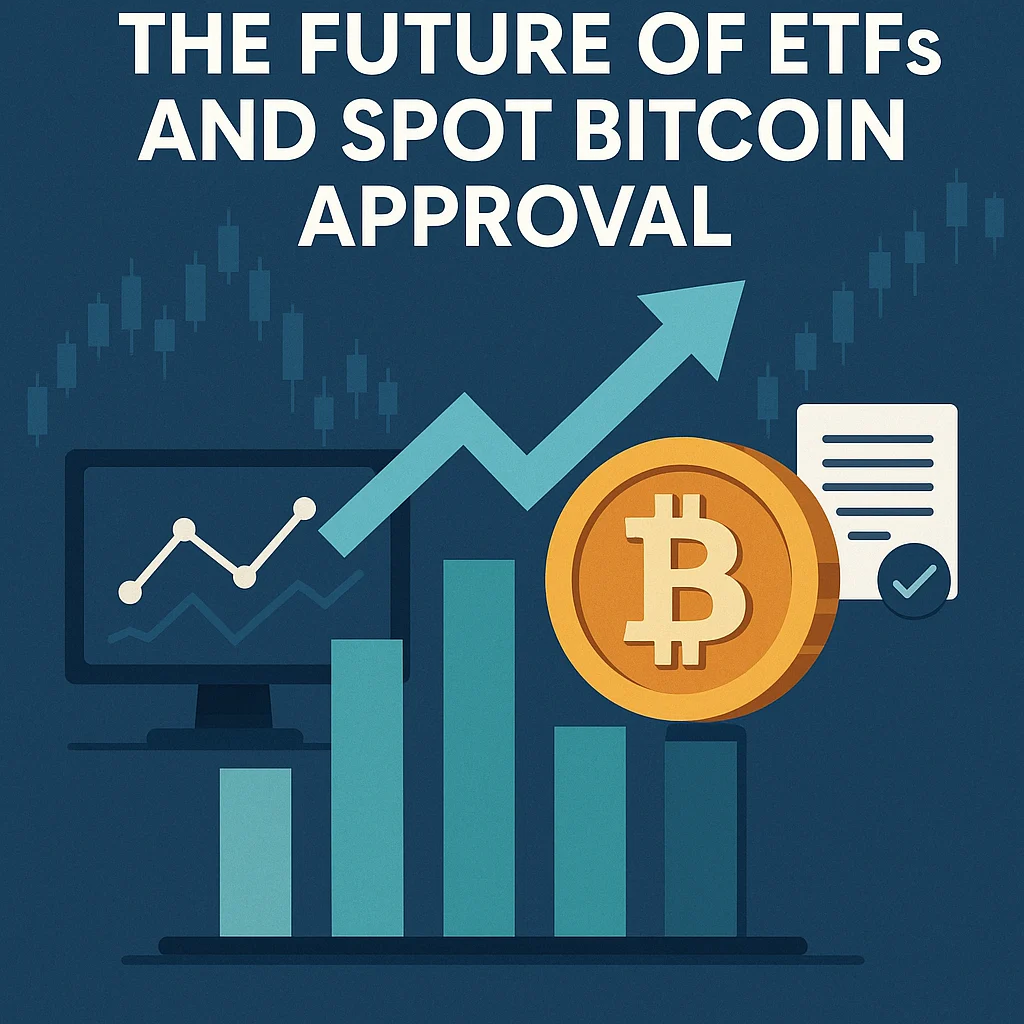Since its fringe origins, cryptocurrency has advanced significantly. What started out as an experimental financial idea is now the focus of international regulatory attention and multibillion-dollar investment strategies. The increasing popularity of Exchange-Traded Funds (ETFs), particularly those associated with Bitcoin, is one of the most obvious indications of the incorporation of cryptocurrency into conventional finance.
Although a number of futures-based cryptocurrency exchange-traded funds (ETFs) have been approved by the market, the eagerly anticipated Bitcoin ETF has emerged as a key issue at the nexus of institutional and cryptocurrency investing. It's more than just a technicality; it's a revolutionary idea that could change how investors obtain Bitcoin and how authorities and conventional financial systems view the cryptocurrency.
We'll go into great detail about the development of crypto ETFs, the importance of spot Bitcoin ETFs, recent approvals, difficulties, and potential future developments for these cutting-edge financial products in this blog.
What Is a Crypto ETF?
Investors can obtain exposure to cryptocurrency assets without actually owning them by investing in a crypto ETF (Exchange-Traded Fund), a regulated investment vehicle that tracks the price of one or more cryptocurrencies.
Crypto ETFs are traded on conventional stock exchanges, just like other ETFs. As with stocks, investors can purchase or sell shares of the ETF, allowing both institutional and individual investors to participate more widely.
Types of Crypto ETFs
There are generally two types of crypto ETFs:
1. Futures-Based ETFs
These track the price of Bitcoin (or other crypto assets) through derivatives contracts—primarily Bitcoin futures.
-
Pros: Derivative markets are comparatively mature, and regulatory approval has been simpler.
-
Cons: can differ from actual spot prices and is prone to "roll costs" as contracts expire and are replaced.
2. Spot-Based ETFs
These are backed by actual Bitcoin held in cold storage by custodians. The ETF shares reflect the current ("spot") market price of Bitcoin.
-
Pros: Direct exposure to the asset and more precise price tracking.
-
Cons: regulatory issues pertaining to market supervision, manipulation, and custody.
Why Spot Bitcoin ETFs Matter
While futures-based ETFs are a step toward mainstream acceptance, spot ETFs are widely seen as the real prize.
Benefits of Spot Bitcoin ETFs:
-
Direct Exposure: Investors gain exposure to real Bitcoin without handling wallets, keys, or exchanges.
-
Institutional Adoption: Pension funds, banks, and hedge funds can invest through familiar vehicles.
-
Price Stability: Reduced volatility due to more efficient arbitrage and broader participation.
-
Market Legitimacy: Adds a layer of regulatory clarity and credibility to Bitcoin.
The approval of a spot Bitcoin ETF signals the transition of Bitcoin from a speculative asset to a regulated, institutional-grade investment.
A Brief History of Spot Bitcoin ETF Attempts
Since 2013, several asset managers have attempted to obtain approval for a spot Bitcoin ETF, but regulators such as the U.S. Securities and Exchange Commission (SEC) have consistently denied their requests. The following were the main issues raised:
-
Market Manipulation: Because there was little oversight, bitcoin markets were thought to be easily manipulated.
-
Lack of Surveillance Sharing Agreements: The SEC wanted exchanges to work with them to prevent fraud.
-
Custody Risks: Concerns over how Bitcoin would be stored securely.
Key Rejected Applications:
-
Winklevoss Twins (Gemini) – 2013
-
VanEck/SolidX – Multiple attempts
-
Grayscale Bitcoin Trust (GBTC) – Attempted to convert into a spot ETF
-
Fidelity, ARK, NYDIG – All rejected in previous cycles
The Turning Point: 2024 and Beyond
In a historic move, the SEC and other key regulators approved several spot Bitcoin ETFs in 2024. Years of pressure, court cases, and a developing cryptocurrency market with greater trading volume, transparency, and institutional oversight were all factors in these approvals.
Why It Happened Now:
-
Improved Market Maturity
-
Bitcoin trading has moved toward regulated, reputable exchanges.
-
Surveillance-sharing agreements have addressed concerns about market manipulation.
-
-
Legal Pressure
-
Grayscale sued the SEC for denying its spot ETF application while approving futures-based ETFs.
-
The court sided with Grayscale, forcing the SEC to reconsider its stance.
-
-
Custody Advancements
-
Firms like Coinbase, Fidelity Digital Assets, and BitGo offer institutional-grade custody.
-
-
Political and Economic Shifts
-
Rising inflation, global uncertainty, and demand for alternative assets increased interest in Bitcoin.
-
Who’s Leading the Spot Bitcoin ETF Space?
Several major asset managers now offer spot Bitcoin ETFs, including:
-
BlackRock (iShares Bitcoin Trust): Possibly the most significant endorsement. BlackRock's arrival cleared the path for others and gave it more legitimacy.
-
Fidelity (Wise Origin Bitcoin Trust)
-
ARK Invest and 21Shares
-
Grayscale (GBTC converted into an ETF)
These funds now allow everyday investors to gain Bitcoin exposure through standard brokerage accounts and retirement portfolios.
Impact on Bitcoin and the Crypto Market
1. Price Action
When spot ETFs were approved, billions of dollars poured into the new vehicles, causing significant price rallies. ETFs are seen by analysts as important drivers of Bitcoin's long-term growth.
2. Institutional Flows
Spot ETFs made it possible for wealth managers, family offices, and pensions to invest in Bitcoin. This lowers volatility and increases liquidity.
3. Legitimization
Bitcoin is now acknowledged as a legitimate asset class by traditional finance. A regulator's "stamp of approval" is considered to be the approval of a spot ETF.
4. Better Infrastructure
More attention on security, custody, and regulatory compliance strengthens the overall crypto ecosystem.
The Next Wave: What Comes After Bitcoin ETFs?
1. Ethereum Spot ETFs
Issuers have applied for Ethereum spot ETFs after the success of Bitcoin ETFs. The fact that Ethereum futures ETFs were approved in 2023 indicates that it will happen eventually.
2. Multi-Asset Crypto ETFs
These would track baskets of crypto assets—ideal for diversified exposure to the broader Web3 ecosystem.
3. DeFi and NFT Index Funds
DeFi tokens and NFT-related investments are examples of more complicated products, though obtaining regulatory approval might be more challenging.
4. Global Expansion
Spot crypto ETFs are already available in Canada, Brazil, Switzerland, and Hong Kong. As demand increases, more countries will probably follow.
Challenges and Risks Ahead
Even with approvals, crypto ETFs are not without issues:
1. Volatility
Bitcoin remains highly volatile. ETF investors can still face large drawdowns.
2. Custody Risk
Though institutional custodians have improved, security breaches are still a concern.
3. Regulatory Whiplash
Changing political leadership or policy shifts could introduce new restrictions or taxes on crypto ETFs.
4. Fee Wars
As competition heats up, ETF providers may slash fees, impacting long-term profitability and fund sustainability.
5. Centralization vs. Decentralization
Some crypto purists argue that ETFs go against the core ethos of decentralization by reintroducing intermediaries.
Final Thoughts
An important milestone in the integration of traditional finance and the decentralized realm of cryptocurrencies has been reached with the approval of spot Bitcoin ETFs. Bitcoin's acceptance, at least in part, by the established financial system it once sought to upend is a significant milestone rather than merely another investment product.
Better regulatory oversight, easier access to Bitcoin, and institutional-grade tools for portfolio diversification are all benefits for investors. More legitimacy, wider adoption, and a stronger argument for cryptocurrencies as long-term value stores are all benefits for the crypto industry.
Cryptocurrency ETFs have a bright future ahead of them. There will probably be a revolution in how people invest globally as products advance and more assets are approved, not just in Bitcoin but in the blockchain economy as a whole.




Leave a Reply